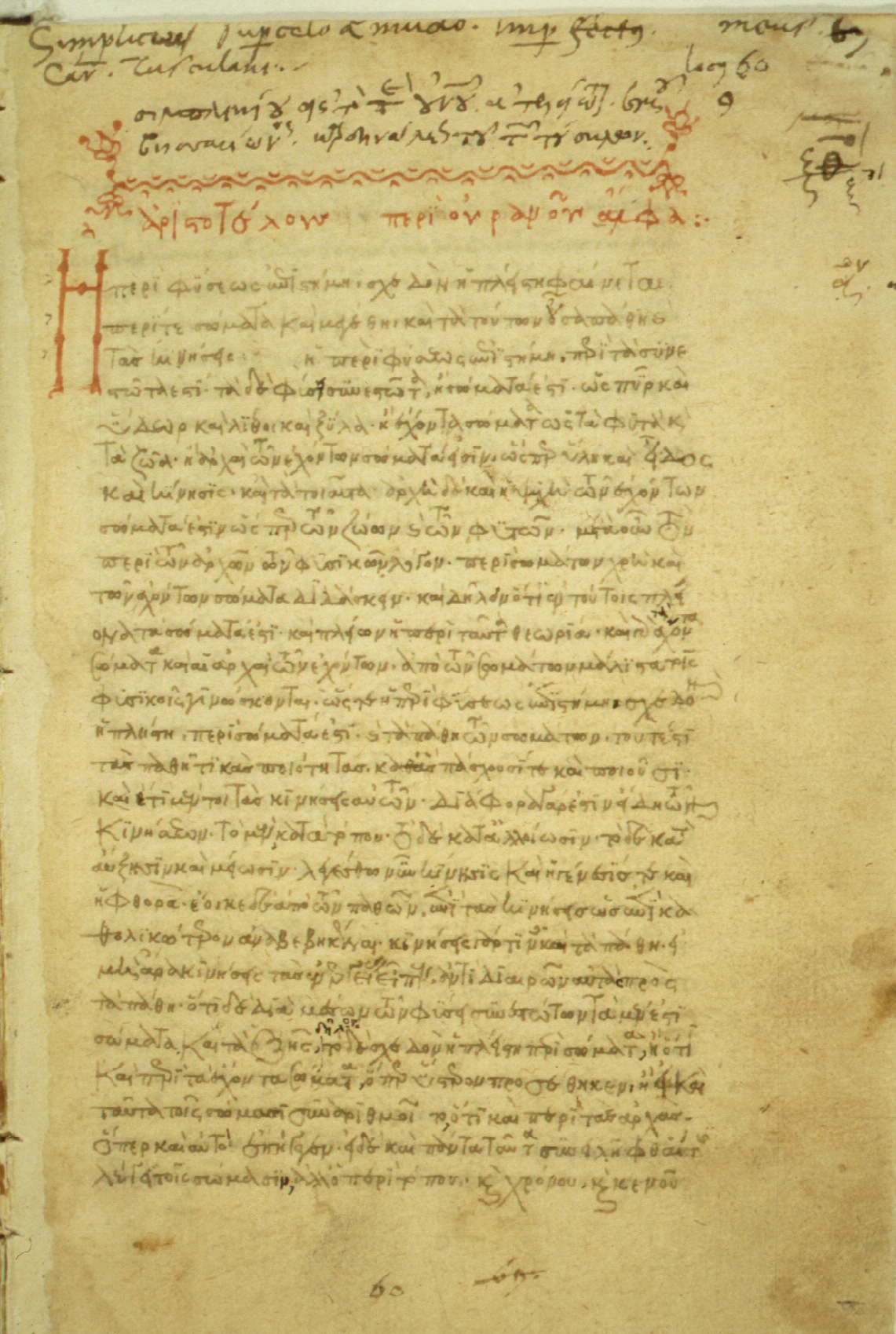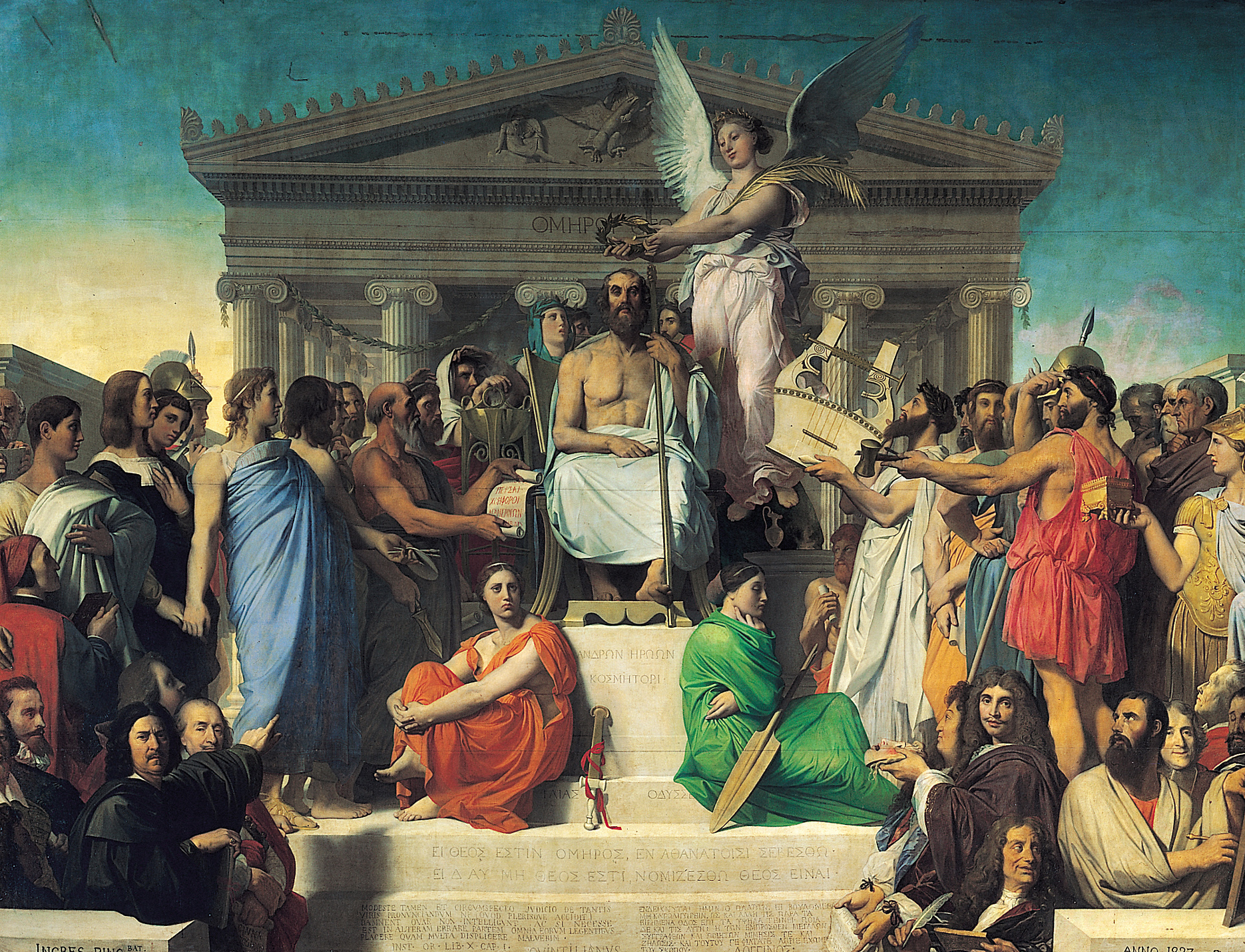|
Herminus
Herminus ( el, Ἑρμῖνος; 2nd century) was a Peripatetic philosopher. He lived in the first half of the 2nd century. He appears to have written commentaries on most of the works of Aristotle. Simplicius says he was the teacher of Alexander of Aphrodisias. We learn from Alexander's commentary on the ''Prior Analytics'' that Herminus had worked on Aristotle's syllogistic system, adding innovations which Alexander disapproved of. His writings, of which nothing remains, are frequently referred to by Boethius, who mentions a treatise by him, ''On Interpretation'' ( el, περὶ Ἑρμηνείας), as also ''Analytics'' and ''Topics''. A Stoic philosopher called Herminus is mentioned by Longinus Longinus () is the name given to the unnamed Roman soldier who pierced the side of Jesus with a lance and who in medieval and some modern Christian traditions is described as a convert to Christianity. His name first appeared in the apocryphal G ... in the preface to his book ''On ... [...More Info...] [...Related Items...] OR: [Wikipedia] [Google] [Baidu] |
Alexander Of Aphrodisias
Alexander of Aphrodisias ( grc-gre, Ἀλέξανδρος ὁ Ἀφροδισιεύς, translit=Alexandros ho Aphrodisieus; AD) was a Peripatetic school, Peripatetic philosopher and the most celebrated of the Ancient Greek Commentaries on Aristotle, commentators on the writings of Aristotle. He was a native of Aphrodisias in Caria, and lived and taught in Athens at the beginning of the 3rd century, where he held a position as head of the Peripatetic school. He wrote many commentaries on the works of Aristotle, extant are those on the ''Prior Analytics'', ''Topics (Aristotle), Topics'', ''Meteorology (Aristotle), Meteorology'', ''Sense and Sensibilia (Aristotle), Sense and Sensibilia'', and ''Metaphysics (Aristotle), Metaphysics''. Several original treatises also survive, and include a work ''On Fate'', in which he argues against the Stoicism, Stoic doctrine of necessity; and one ''On the Soul''. His commentaries on Aristotle were considered so useful that he was styled, by way of ... [...More Info...] [...Related Items...] OR: [Wikipedia] [Google] [Baidu] |
Peripatetic School
The Peripatetic school was a school of philosophy in Ancient Greece. Its teachings derived from its founder, Aristotle (384–322 BC), and ''peripatetic'' is an adjective ascribed to his followers. The school dates from around 335 BC when Aristotle began teaching in the Lyceum. It was an informal institution whose members conducted philosophical and scientific inquiries. After the middle of the 3rd century BC, the school fell into a decline, and it was not until the Roman era that there was a revival. Later members of the school concentrated on preserving and commenting on Aristotle's works rather than extending them; it died out in the 3rd century. The study of Aristotle's works by scholars who were called Peripatetics continued through late antiquity, the Middle Ages, and the Renaissance. After the fall of the Western Roman Empire, the works of the Peripatetic school were lost to the Latin West, but they were preserved in Byzantium and also incorporated into early Islamic phil ... [...More Info...] [...Related Items...] OR: [Wikipedia] [Google] [Baidu] |
Aristotle
Aristotle (; grc-gre, Ἀριστοτέλης ''Aristotélēs'', ; 384–322 BC) was a Greek philosopher and polymath during the Classical period in Ancient Greece. Taught by Plato, he was the founder of the Peripatetic school of philosophy within the Lyceum and the wider Aristotelian tradition. His writings cover many subjects including physics, biology, zoology, metaphysics, logic, ethics, aesthetics, poetry, theatre, music, rhetoric, psychology, linguistics, economics, politics, meteorology, geology, and government. Aristotle provided a complex synthesis of the various philosophies existing prior to him. It was above all from his teachings that the West inherited its intellectual lexicon, as well as problems and methods of inquiry. As a result, his philosophy has exerted a unique influence on almost every form of knowledge in the West and it continues to be a subject of contemporary philosophical discussion. Little is known about his life. Aristotle was born in th ... [...More Info...] [...Related Items...] OR: [Wikipedia] [Google] [Baidu] |
Simplicius Of Cilicia
Simplicius of Cilicia (; el, Σιμπλίκιος ὁ Κίλιξ; c. 490 – c. 560 AD) was a disciple of Ammonius Hermiae and Damascius, and was one of the last of the Neoplatonists. He was among the pagan philosophers persecuted by Justinian in the early 6th century, and was forced for a time to seek refuge in the Persian court, before being allowed back into the empire. He wrote extensively on the works of Aristotle. Although his writings are all commentaries on Aristotle and other authors, rather than original compositions, his intelligent and prodigious learning makes him the last great philosopher of pagan antiquity. His works have preserved much information about earlier philosophers which would have otherwise been lost. Life Simplicius was a disciple of Ammonius Hermiae, and Damascius, and was consequently one of the last members of the Neoplatonist school. The school had its headquarters in Athens. It became the centre of the last efforts to maintain Hellenistic religi ... [...More Info...] [...Related Items...] OR: [Wikipedia] [Google] [Baidu] |
Prior Analytics
The ''Prior Analytics'' ( grc-gre, Ἀναλυτικὰ Πρότερα; la, Analytica Priora) is a work by Aristotle on reasoning, known as his syllogistic, composed around 350 BCE. Being one of the six extant Aristotelian writings on logic and scientific method, it is part of what later Peripatetics called the ''Organon''. Modern work on Aristotle's logic builds on the tradition started in 1951 with the establishment by Jan Łukasiewicz of a revolutionary paradigm. His approach was replaced in the early 1970s in a series of papers by John Corcoran and Timothy Smiley—which inform modern translations of ''Prior Analytics'' by Robin Smith in 1989 and Gisela Striker in 2009. The term ''analytics'' comes from the Greek words ''analytos'' (ἀναλυτός, 'solvable') and ''analyo'' (ἀναλύω, 'to solve', literally 'to loose'). However, in Aristotle's corpus, there are distinguishable differences in the meaning of ἀναλύω and its cognates. There is also the possi ... [...More Info...] [...Related Items...] OR: [Wikipedia] [Google] [Baidu] |
Syllogistic
A syllogism ( grc-gre, συλλογισμός, ''syllogismos'', 'conclusion, inference') is a kind of logical argument that applies deductive reasoning to arrive at a conclusion based on two propositions that are asserted or assumed to be true. In its earliest form (defined by Aristotle in his 350 BCE book '' Prior Analytics''), a syllogism arises when two true premises (propositions or statements) validly imply a conclusion, or the main point that the argument aims to get across. For example, knowing that all men are mortal (major premise) and that Socrates is a man (minor premise), we may validly conclude that Socrates is mortal. Syllogistic arguments are usually represented in a three-line form: All men are mortal. Socrates is a man. Therefore, Socrates is mortal.In antiquity, two rival syllogistic theories existed: Aristotelian syllogism and Stoic syllogism. From the Middle Ages onwards, ''categorical syllogism'' and ''syllogism'' were usually used interchangeably. This a ... [...More Info...] [...Related Items...] OR: [Wikipedia] [Google] [Baidu] |
Boethius
Anicius Manlius Severinus Boethius, commonly known as Boethius (; Latin: ''Boetius''; 480 – 524 AD), was a Roman senator, consul, ''magister officiorum'', historian, and philosopher of the Early Middle Ages. He was a central figure in the translation of the Greek classics into Latin, a precursor to the Scholastic movement, and, along with Cassiodorus, one of the two leading Christian scholars of the 6th century. The local cult of Boethius in the Diocese of Pavia was sanctioned by the Sacred Congregation of Rites in 1883, confirming the diocese's custom of honouring him on the 23 October. Boethius was born in Rome a few years after the collapse of the Western Roman Empire. A member of the Anicii family, he was orphaned following the family's sudden decline and was raised by Quintus Aurelius Memmius Symmachus, a later consul. After mastering both Latin and Greek in his youth, Boethius rose to prominence as a statesman during the Ostrogothic Kingdom: becoming a senator by a ... [...More Info...] [...Related Items...] OR: [Wikipedia] [Google] [Baidu] |
Stoicism
Stoicism is a school of Hellenistic philosophy founded by Zeno of Citium in Athens in the early 3rd century Common Era, BCE. It is a philosophy of personal virtue ethics informed by its system of logic and its views on the natural world, asserting that the practice of virtue is both necessary and sufficient to achieve Eudaimonia, (happiness, ): one flourishes by living an Ethics, ethical life. The Stoics identified the path to with a life spent practicing the cardinal virtues and living in accordance with nature. The Stoics are especially known for teaching that "virtue is the only good" for human beings, and that external things, such as health, wealth, and pleasure, are not good or called in themselves (''adiaphora'') but have value as "material for virtue to act upon". Alongside Aristotelian ethics, the Stoic tradition forms one of the major founding approaches to virtue ethics. The Stoics also held that certain destructive emotions resulted from errors of judgment, and th ... [...More Info...] [...Related Items...] OR: [Wikipedia] [Google] [Baidu] |
Cassius Longinus (philosopher)
Cassius Longinus (; el, Κάσσιος Λογγῖνος; c. 213 – 273 AD) was a Greek rhetorician and philosophical critic. Born in either Emesa or Athens, he studied at Alexandria under Ammonius Saccas and Origen the Pagan, and taught for thirty years in Athens, one of his pupils being Porphyry. Longinus did not embrace the Neoplatonism then being developed by Plotinus, but continued as a Platonist of the old type and his reputation as a literary critic was immense. During a visit to the east, he became a teacher, and subsequently chief counsellor to Zenobia, queen of Palmyra. It was by his advice that she endeavoured to regain her independence from Rome. Emperor Aurelian, however, crushed the revolt, and Longinus was executed. Life The origin of his gentile name Cassius is unknown; it can only be conjectured that he was the client to some Cassius Longinus, or that his ancestors had received the Roman franchise through the influence of some Cassius Longinus. He ... [...More Info...] [...Related Items...] OR: [Wikipedia] [Google] [Baidu] |
Roman-era Peripatetic Philosophers
The Roman Empire ( la, Imperium Romanum ; grc-gre, Βασιλεία τῶν Ῥωμαίων, Basileía tôn Rhōmaíōn) was the post-Roman Republic, Republican period of ancient Rome. As a polity, it included large territorial holdings around the Mediterranean Sea in Europe, North Africa, and Western Asia, and was ruled by Roman emperor, emperors. From the Constitutional reforms of Augustus, accession of Caesar Augustus as the first Roman emperor to the Crisis of the Third Century, military anarchy of the 3rd century, it was a Principate with Roman Italy, Italia as the metropole of Roman province, its provinces and the Rome, city of Rome as its sole capital. The Empire was later ruled by dominate, multiple emperors who shared control over the Western Roman Empire and the Byzantine Empire#Early history, Eastern Roman Empire. The city of Rome remained the nominal capital of both parts until AD 476 when the imperial insignia were sent to Constantinople following the capture of ... [...More Info...] [...Related Items...] OR: [Wikipedia] [Google] [Baidu] |






_-_BEIC_6353768.jpg)

